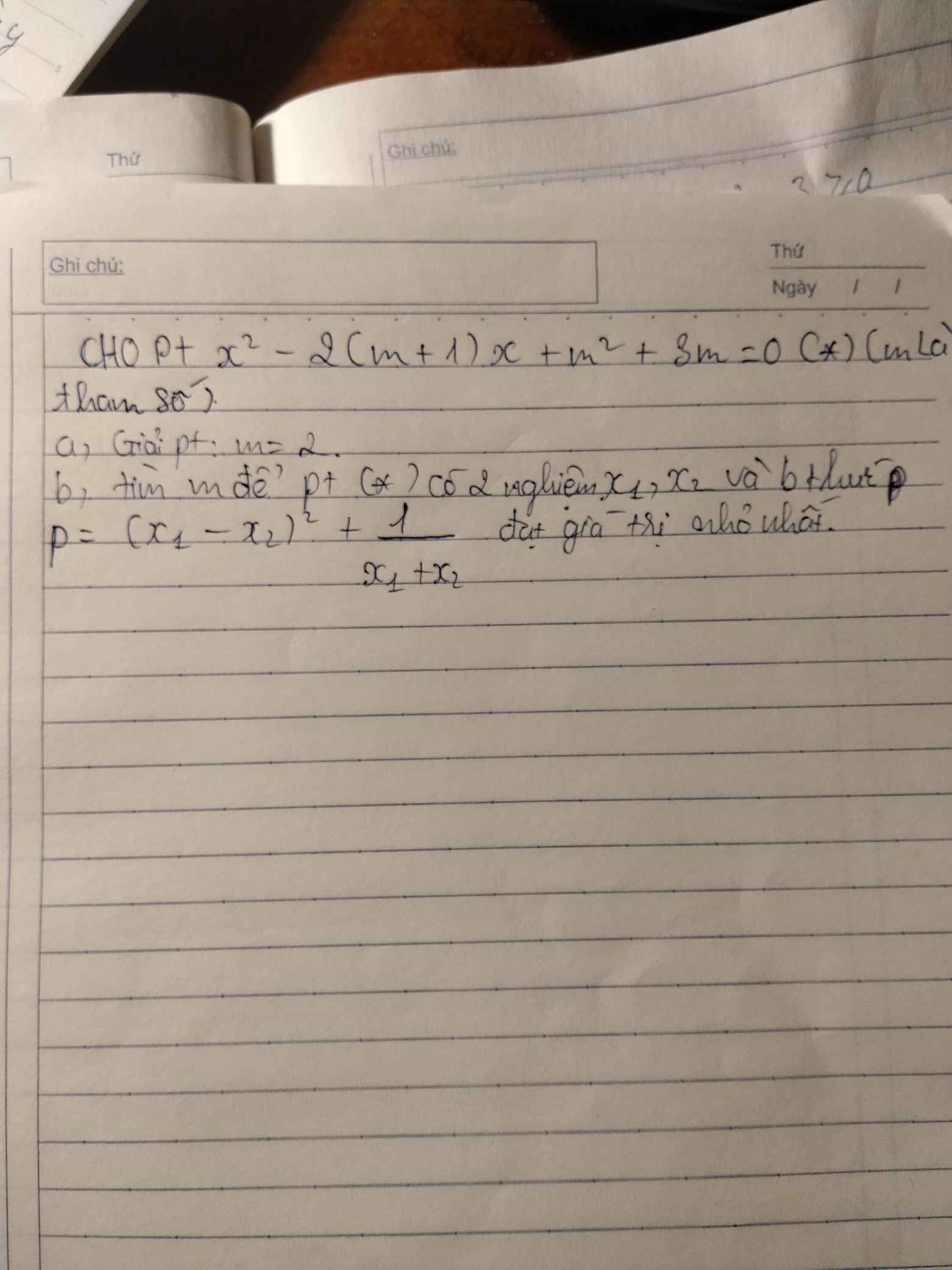Tìm nghiệm m để pt m2x+2=x+m22+m cs nghiệm âm(m là tham số)
Hãy nhập câu hỏi của bạn vào đây, nếu là tài khoản VIP, bạn sẽ được ưu tiên trả lời.


a.
Khi \(m=2\) pt trở thành:
\(2x+3=0\Rightarrow x=-\dfrac{3}{2}\)
b.
Để pt có nghiệm \(x=-1\)
\(\Rightarrow\left(m^2-m\right).\left(-1\right)+m^2-1=0\)
\(\Leftrightarrow-m^2+m+m^2-1=0\)
\(\Leftrightarrow m-1=0\)
\(\Leftrightarrow m=1\)
c.
Pt tương đương:
\(\left(m^2-m\right)x=-\left(m^2-1\right)\)
\(\Leftrightarrow m\left(m-1\right)x=-\left(m-1\right)\left(m+1\right)\)
Pt vô nghiệm khi:
\(\left\{{}\begin{matrix}m\left(m-1\right)=0\\-\left(m-1\right)\left(m+1\right)\ne0\end{matrix}\right.\) \(\Leftrightarrow m=0\)
\(\Rightarrow\) pt có nghiệm khi \(m\ne0\)
Pt có vô số nghiệm khi:
\(\left\{{}\begin{matrix}m\left(m-1\right)=0\\-\left(m-1\right)\left(m+1\right)=0\end{matrix}\right.\) \(\Leftrightarrow m=1\)
Lời giải:
a. Khi $m=2$ thì pt trở thành:
$2x+3=0\Leftrightarrow x=-\frac{3}{2}$
b. Để pt có nghiệm $x=-1$ thì:
$(m^2-m).(-1)+m^2-1=0$
$\Leftrightarrow m-1=0\Leftrightarrow m=1$
c.
PT $\Leftrightarrow (m^2-m)x=1-m^2$
Để pt vô nghiệm thì: \(\left\{\begin{matrix} m^2-m=0\\ 1-m^2\neq 0\end{matrix}\right.\Leftrightarrow \left\{\begin{matrix} m(m-1)=0\\ (1-m)(1+m)\neq 0\end{matrix}\right.\)
\(\Leftrightarrow m=0\)
PT có vô số nghiệm khi \(\left\{\begin{matrix} m^2-m=0\\ 1-m^2= 0\end{matrix}\right.\Leftrightarrow m=1\)
Để PT có nghiệm thì: $m\neq 0$

a Khi m=1 thì (1) sẽ là x^2+1=0
=>x thuộc rỗng
b: Thay x=1 vào (1),ta được:
1^2-2(m-1)+m^2=0
=>m^2+1-2m+2=0
=>m^2-2m+3=0
=>PTVN
c: Thay x=-3 vào pt, ta được:
(-3)^2-2*(m-1)*(-3)+m^2=0
=>m^2+9+6(m-1)=0
=>m^2+6m+3=0
=>\(m=-3\pm\sqrt{6}\)

Bài 2:
Để phương trình có hai nghiệm trái dấu thì (m-2)(m+2)<0
hay -2<m<2

Do pt có nghiệm \(x=1\) nên \(a+b+c=0\Rightarrow1-2m+m-4=0\)
\(\Rightarrow m=-3\)
Giá trị của nghiệm còn lại là: \(x_2=\dfrac{c}{a}=\dfrac{m-4}{1}=-7\)

Ta có: \(\Delta=4\left(m-3\right)^2-4.\left(m^2-1\right)\)
a. Để phương trình vô nghiệm thì \(\Delta< 0\Leftrightarrow\left(m-3\right)^2< m^2-1\Leftrightarrow m^2-6m+9< m^2-1\Leftrightarrow6m>10\Leftrightarrow m>\dfrac{10}{6}=\dfrac{5}{3}\)
b. Để phương trình có nghiệm thì:
\(\Delta\ge0\Leftrightarrow\left(m-3\right)^2\ge m^2-1\Leftrightarrow m^2-6m+9\ge m^2-1\Leftrightarrow6m\le10\Leftrightarrow m\le\dfrac{10}{6}=\dfrac{5}{3}\)
c. Để phương trình có nghiệm kép thì:
\(\Delta=0\Leftrightarrow\left(m-3\right)^2=m^2-1\Leftrightarrow m^2-6m+9=m^2-1\Leftrightarrow6m=10\Leftrightarrow m=\dfrac{10}{6}=\dfrac{5}{3}\)
Nghiệm kép của phương trình là: \(\dfrac{-b}{2a}=\dfrac{2\left(m-3\right)}{2.1}=\dfrac{2\left(\dfrac{5}{3}-3\right)}{2}=-\dfrac{4}{3}\)
d. Để phương trình có nghiệm phân biệt thì:
\(\Delta>0\Leftrightarrow\left(m-3\right)^2>m^2-1\Leftrightarrow m^2-6m+9>m^2-1\Leftrightarrow6m< 10\Leftrightarrow m< \dfrac{10}{6}=\dfrac{5}{3}\)
a, Để pt vô nghiệm
\(\Delta'=\left(m-3\right)^2-\left(m^2-1\right)=-6m+9+1=-6m+10< 0\Leftrightarrow m>\dfrac{5}{3}\)
b, Để pt có nghiệm
\(\Delta'=-6m+10\ge0\Leftrightarrow m\le\dfrac{5}{3}\)
c, Để pt có nghiệm kép
\(\Delta'=-6m+10=0\Leftrightarrow m=\dfrac{5}{3}\)
\(x_1=x_2=\dfrac{2\left(m-3\right)}{2}=m-3\)
d, Để pt có 2 nghiệm pb
\(\Delta=-6m+10>0\Leftrightarrow m< \dfrac{5}{3}\)

\(2)mx^2-2\left(m-1\right)x+m-1=0\)
Để pt có nghiệm kép \(\Leftrightarrow\left\{{}\begin{matrix}a\ne0\\\Delta=0\end{matrix}\right.\)
\(\Leftrightarrow\left\{{}\begin{matrix}m\ne0\\\left[-2\left(m-1\right)\right]^2-4m\left(m-1\right)=0\end{matrix}\right.\)
\(\Leftrightarrow4\left(m^2-2m+1\right)-4m^2+4m=0\)
\(\Leftrightarrow4m^2-8m+4-4m^2+4m=0\)
\(\Leftrightarrow-4m+4=0\)
\(\Leftrightarrow m=1\)
Vậy để pt trên có nghiệm kép thì \(\left\{{}\begin{matrix}m\ne0\\m=1\end{matrix}\right.\)

Để pt có nghiệm thì \(\Delta'=\left(m+1\right)^2-\left(m^2+3m\right)\ge0\Leftrightarrow1-m\ge0\Leftrightarrow m\le1\)
a)Tự làm
b)Để pt có hai nghiệm <=>\(\Delta=4\left(m+1\right)^2-4\left(m^2+3m\right)=-4m+4\ge0\)
<=>\(m\le1\)
Theo viet: \(\left\{{}\begin{matrix}x_1+x_2=2\left(m+1\right)\\x_1x_2=m^2+3m\end{matrix}\right.\)
Có \(P=\left(x_1-x_2\right)^2+\dfrac{1}{x_1+x_2}\)(đk: \(x_1+x_2\ne0\Rightarrow m\ne-1\))
\(=\left(x_1+x_2\right)^2-4x_1x_2+\dfrac{1}{x_1+x_2}\)
\(=4\left(m+1\right)^2-4\left(m^2+3m\right)+\dfrac{1}{2\left(m+1\right)}\)
\(=-4m+4+\dfrac{1}{2m+2}\)\(=\dfrac{-8m^2+9}{2m+2}\)
\(\Rightarrow P\left(2m+2\right)=-8m^2+9\)
\(\Leftrightarrow-8m^2-2mP+9-2P=0\) (1)
Coi (1) là pt bậc hai ẩn m và \(m\le1\), \(m\ne-1\)
Pt (1) có nghiệm\(\Leftrightarrow\left\{{}\begin{matrix}\Delta=4P^2-64P+288\ge0\left(lđ\right)\\m_1+m_2\le2\\\left(m_1-1\right)\left(m_2-1\right)\le0\end{matrix}\right.\)
\(\Rightarrow\left\{{}\begin{matrix}-\dfrac{1}{P}\le2\\m_1.m_2-\left(m_1+m_2\right)+1\le0\end{matrix}\right.\)
\(\Leftrightarrow\left\{{}\begin{matrix}P\ge-2\\\dfrac{9-2P}{-8}+\dfrac{P}{4}+1\le0\end{matrix}\right.\) \(\Leftrightarrow\left\{{}\begin{matrix}P\ge-16\\P\ge\dfrac{1}{4}\end{matrix}\right.\)
\(\Rightarrow P\ge\dfrac{1}{4}\)
\(\Rightarrow P_{min}=\dfrac{1}{4}\Leftrightarrow m=1\) (thỏa)
Vậy...
